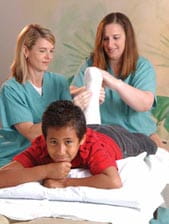Serial Casting
Serial casting is a noninvasive procedure that helps children improve their range of motion so they can perform daily activities with less difficulty. A well-padded cast, used to immobilize a joint that is lacking full range of motion, will be applied and removed on a weekly basis. Each cast gradually increases the range of motion in the affected joint.
Who benefits from Serial Casting?
Doctors refer patients for serial casting to help improve overall quality of life. The serial casting program at St. Joseph’s Children’s Hospital helps patients who have a variety of disorders including:
- Cerebral palsy
- Spina bifida
- Brain or spinal cord injury
- Congenital abnormalities
- Muscular dystrophy
- Idiopathic toe walking
- Peripheral neuropathy
Why would a physician refer for Serial Casting?
- To increase range of motion in a joint
- To improve functional mobility
- To achieve the optimum alignment of a joint
- To help prepare a joint for the use of further orthopedic devices such as braces, splints, etc.
- To help eliminate, delay, or minimize the need for surgical intervention
- To help decrease the chance of a deformity developing and/or progressing due to abnormal weight-bearing
What happens during a Serial Casting session?
Muscle strength and range of motion of the affected joint will be assessed prior to application of the cast. A team of specially trained therapists will apply the cast in the joint’s optimal position and range. Instruction about care of the cast and precautions will be reviewed with the family and patient.
How long will we need to come for cast changes?
Casts will be changed on a weekly basis until a target range-of-motion goal is achieved. Predicting the number of casting sessions is difficult, as each individual responds to the casting procedure at different rates. Typically, the casting procedure is completed in 4-6 weeks.
What happens after the casting is finished?
The physician determines what may be needed in terms of orthotics (braces, splints, etc.) to help maintain the newly gained range of motion.
How does Serial Casting affect the patient and family?
A short accommodation period will be required, as the cast has added weight and the joint is now immobile. A walking cast and cast shoe allow children to walk during the period of casting. Daily routines are not altered significantly and patients can stay very active, participating in school and normal activities. The biggest challenge is keeping the cast dry. Sponge bathing is necessary to avoid getting the cast wet.
To schedule an appointment, please call (813) 870-4567. In addition to a referral or insurance authorization, a prescription stating the procedure requested, patient diagnosis, and physician signature are required.
Learn more about our pediatric neuroscience and orthopedic services.
Additional Information

